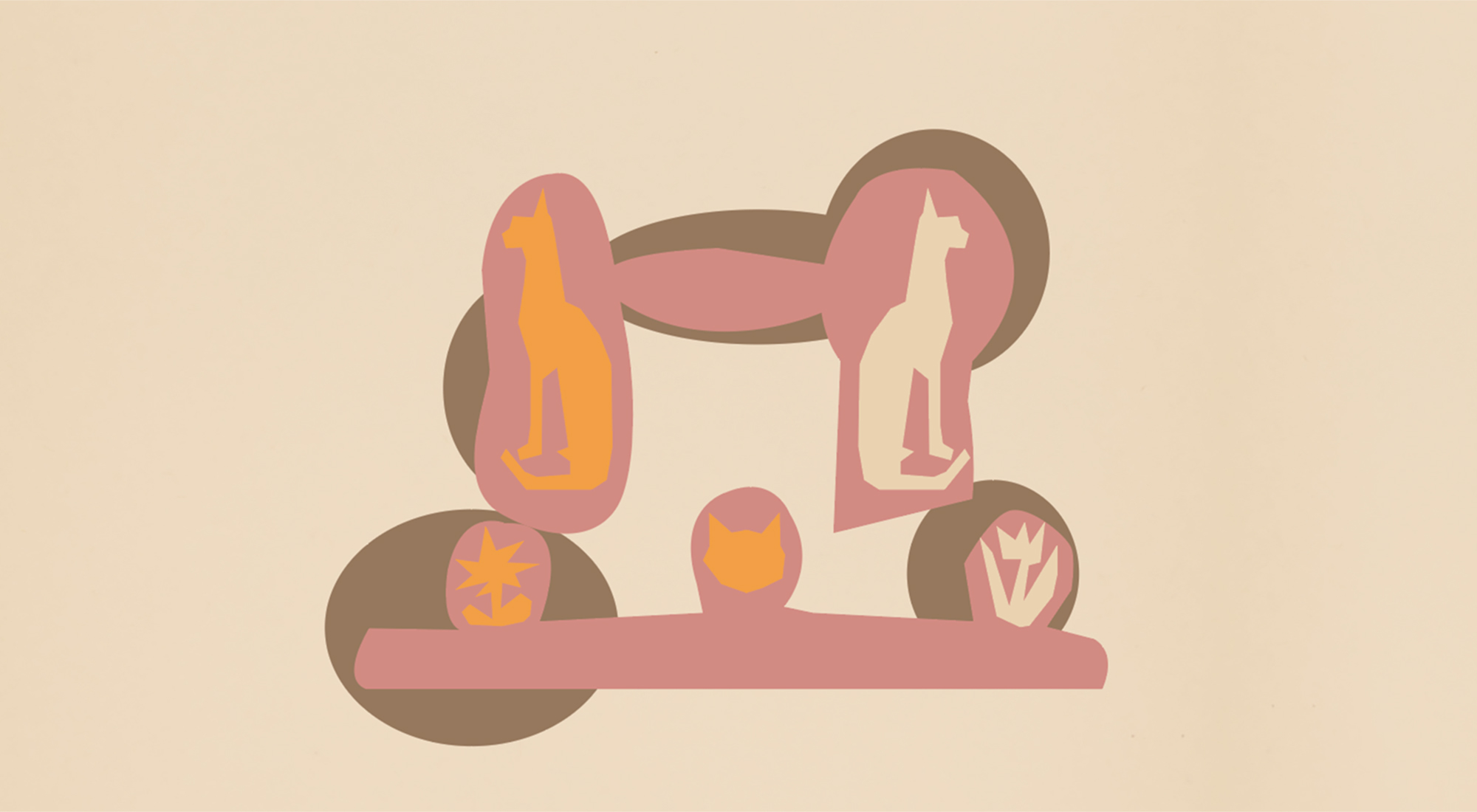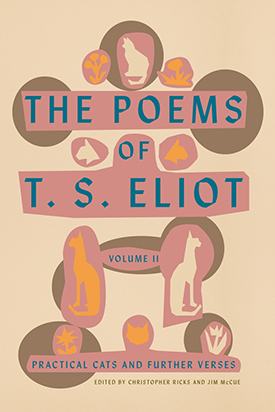Poet, essayist, playwright, and social critic T. S. Eliot was one of the defining voices of the 20th century and an integral part of the Modernist movement. He won the Nobel Prize in literature in 1948 “for his outstanding, pioneer contribution to present-day poetry.” The recently published first paperback edition of The Poems of T. S. Eliot is the authoritative collection of his works, scrupulously edited by Christopher Ricks and Jim McCue who offer in-depth commentary to accompany Eliot’s well-known masterpieces, the poems of his youth, love poems from his final years, and two books of verse. The commentary illuminates the creative activity that came to constitute each poem, calling upon drafts, correspondence, and other original materials to take us inside a mind that never ceased exploring.
What follows are two poems from the second volume, from the section “Practical Cats and Further Verses.”
The Naming of Cats
The Naming of Cats is a difficult matter,
It isn’t just one of your holiday games;
You may think at first I’m as mad as a hatter
When I tell you, a cat must have THREE DIFFERENT NAMES.
First of all, there’s the name that the family use daily,
Such as Peter, Augustus, Alonzo or James,
Such as Victor or Jonathan, George or Bill Bailey—
All of them sensible everyday names.
There are fancier names if you think they sound sweeter,
Some for the gentlemen, some for the dames:
Such as Plato, Admetus, Electra, Demeter—
But all of them sensible everyday names.
But I tell you, a cat needs a name that’s particular,
A name that’s peculiar, and more dignified,
Else how can he keep up his tail perpendicular,
Or spread out his whiskers, or cherish his pride?
Of names of this kind, I can give you a quorum,
Such as Munkustrap, Quaxo, or Coricopat,
Such as Bombalurina, or else Jellylorum—
Names that never belong to more than one cat.
But above and beyond there’s still one name left over,
And that is the name that you never will guess;
The name that no human research can discover—
But THE CAT HIMSELF KNOWS, and will never confess.
When you notice a cat in profound meditation,
The reason, I tell you, is always the same:
His mind is engaged in a rapt contemptation
Of the thought, of the thought, of the thought of his name:
His ineffable effable
Effanineffable
Deep and inscrutable signular Name.
• • •
Mr. Mistoffelees
You ought to know Mr. Mistoffelees!
The Original Conjuring Cat—
(There can be no doubt about that).
Please listen to me and don’t scoff. All his
Inventions are off his own bat.
There’s no such Cat in the metropolis;
He holds all the patent monopolies
For performing surprising illusions
And creating eccentric confusions.
At prestidigitation
And at legerdemain
He’ll defy examination
And deceive you again.
The greatest magicians have something to learn
From Mr. Mistoffelees’ Conjuring Turn.
Presto!
Away we go!
And we all say: OH!
Well I never!
Was there ever
A Cat so clever
As Magical Mr. Mistoffelees!
He is quiet and small, he is black
From his ears to the tip of his tail;
He can creep through the tiniest crack,
He can walk on the narrowest rail.
He can pick any card from a pack,
He is equally cunning with dice;
He is always deceiving you into believing
That he’s only hunting for mice.
He can play any trick with a cork
Or a spoon and a bit of fish-paste;
If you look for a knife or a fork
And you think it is merely misplaced—
You have seen it one moment, and then it is gawn!
But you’ll find it next week lying out on the lawn.
And we all say: OH!
Well I never!
Was there ever
A Cat so clever
As Magical Mr. Mistoffelees!
His manner is vague and aloof,
You would think there was nobody shyer—
But his voice has been heard on the roof
When he was curled up by the fire.
And he’s sometimes been heard by the fire
When he was about on the roof—
(At least we all heard somebody who purred)
Which is incontestable proof
Of his singular magical powers:
And I have known the family to call
Him in from the garden for hours,
While he was asleep in the hall.
And not long ago this phenomenal Cat
Produced seven kittens right out of a hat!
And we all said: OH!
Well I never!
Did you ever
Know a Cat so clever
As Magical Mr. Mistoffelees!
Thomas Stearns Eliot was born in St. Louis, Missouri, in 1888. He moved to England in 1914 and published his first book of poems in 1917. He received the Nobel Prize in Literature in 1948. Eliot died in 1965.
Sir Christopher Ricks is the William M. and Sara B. Warren Professor of the Humanities at Boston University, having formerly been a professor of English at Bristol and at Cambridge. He is a member of the Association of Literary Scholars, Critics, and Writers, of which he was president (2007–2008).
Jim McCue, a former editor at The Times, is the author of Edmund Burke and Our Present Discontents and the editor of Penguin Classics’ Selected Poems of Arthur Hugh Clough. His imprint, the Foundling Press, began with the first separate publication of T. S. Eliot’s Eeldrop and Appleplex and has printed for the first time writings by Alexander Pope, Ben Jonson, Henry James, and A. E. Housman.

